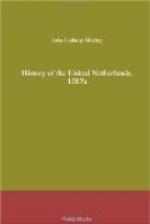It must, in truth, have been somewhat a hard task upon his memory, to keep freshly in mind every detail of the parallel correspondence which he was carrying on with the Spanish and with the English government. Even a cool head like Roland’s might be forgiven for being occasionally puzzled. “So if there be anything hard to be understood,” he observed to Walsingham, “advertise me, and I will make it plainer.” Nothing could be more ingenuous. He confessed, however, to being out of pocket. “Please your honour,” said he, “I have taken great pains to make a bad place something, and it has cost me all the money I had, and here I can receive nothing but discontentment. I dare not write you all lest you should think it impossible,” he added—and it is quite probable that even Walsingham would have been astonished, had Roland written all. The game playing by York and Stanley was not one to which English gentlemen were much addicted.
“I trust the bearer, Edward Stanley; a discreet, brave gentleman,” he said, “with details.” And the remark proves that the gallant youth who had captured this very Fort Zutphen in, so brilliant a manner was not privy to the designs of his brother and of York; for the object of the “discourse” was to deceive the English government.
“I humbly beseech that you will send for me home,” concluded Roland, “for true as I humbled my mind to please her Majesty, your honour, and the dead, now am I content to humble myself lower to please myself, for now, since his, Excellency’s departure, there is no form of proceeding neither honourably nor honestly.”
Three other weeks passed over, weeks of anxiety and dread throughout the republic. Suspicion grew darker than ever, not only as to York and Stanley, but as to all the English commanders, as to the whole English nation. An Anjou plot, a general massacre, was expected by many, yet there were no definite grounds for such dark anticipations. In vain had painstaking, truth-telling Wilkes summoned Stanley to his duty, and called on Leicester, time after time, to interfere. In vain did Sir John Norris, Sir John Conway, the members of the state-council, and all others who should have had authority, do their utmost to avert a catastrophe. Their hands were all tied by the fatal letter of the 24th November. Most anxiously did all implore the Earl of Leicester to return. Never was a more dangerous moment than this for a country to be left to its fate. Scarcely ever in history was there a more striking exemplification of the need of a man—of an individual—who should embody the powers and wishes, and concentrate in one brain and arm, the whole energy, of a commonwealth. But there was no such man, for the republic had lost its chief when Orange died. There was much wisdom and patriotism now. Olden-Barneveld was competent, and so was Buys, to direct the councils of the republic, and there were few better soldiers than Norris and Hohenlo to lead her armies against Spain. But the supreme authority had been confided to Leicester. He had not perhaps proved himself extraordinarily qualified for his post, but he was the governor-in-chief, and his departure, without resigning his powers, left the commonwealth headless, at a moment when singleness of action was vitally important.




